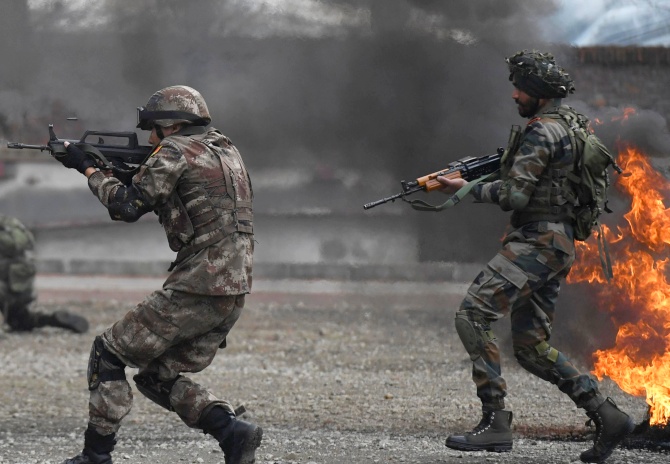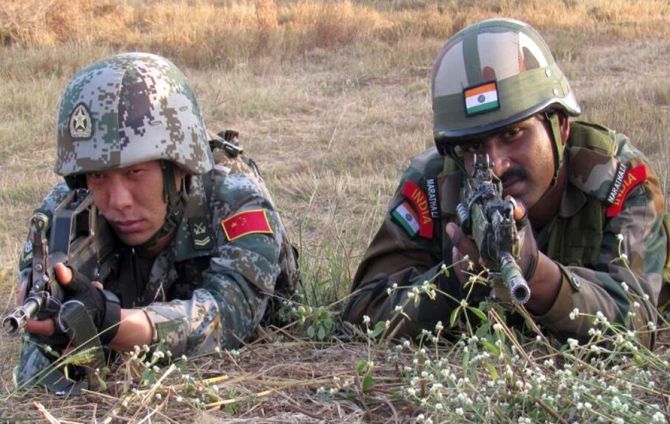Border skirmishes: China's strategy to unsettle India
by VIRENDRA KAPOOR'Post the pandemic, when India is turning a new leaf in its economic policy with an eye on foreign capital and global supply chains that are likely to leave China, heightened tensions on the India-China border creates an atmosphere of uncertainty,' observes Virendra Kapoor.

IMAGE: Soldiers from the Indian Army and China's People's Liberation Army take part in a 'Hand in Hand' joint military exercise. Photograph: Yuan/CNS/Reuters
The coronavirus pandemic has not deterred China from creating tension on the India-China border.
The pandemic may be one of the reasons why China has stepped up aggressive patrolling in the Ladakh region.
It may want to pressure India not to join other countries in demanding accountability for the Wuhan-origin virus and its initial mishandling of the pandemic.
Had China acted in time and stopped outward-bound flights last December, the deadly virus may not have spread like wildfire, laying low mighty nations and failing some of the best public health systems in the world.
Also, post the pandemic, when India is turning a new leaf in its economic policy with an eye on foreign capital and global supply chains that are likely to leave China, heightened tensions on the India-China border creates an atmosphere of uncertainty.
Foreign capital shuns a hint of domestic instability. Despite a stifling political system, one reason China was the hub for global supply chains was because of its orderly domestic situation.
A democratic India wracked by tensions on the border with the second most powerful nation in the world will not inspire confidence in the boardrooms of iconic global companies.
Border skirmishes would naturally force India to further divert energies and precious resources to bolster its defences.
This may be the Chinese intent as well. Skirmishes at the border are not an isolated event.
It is an integral part of the brazenly aggressive diplomacy the Chinese have begun to pursue in recent times.
Superior economic and military power seems to have emboldened the leadership of the Chinese Communist Party to try and force everyone into meek submission.
The way Beijing reacts angrily even to a mild suggestion that the coronavirus pandemic was China-born indicates an offensive attitude.
There are more compelling examples to prove China's power-drunk behaviour. It is acting like an international bully, a bad boy of global diplomacy.
China seems to have given up all pretence to conduct diplomacy in a civilised and well-ordered manner.

IMAGE: Indian and Chinese soldiers at the 'Hand in Hand' joint military training exercise. Photograph: Kind courtesy Indian Army.
The other day, Australian Prime Minister Scott Morrison spoke for the wider world when he called for an inquiry into the origin of coronavirus and its handling by China.
Immediately, China's ambassador in Canberra publicly threatened Australia with economic reprisals, warning that import of beef, wine and barley would be stopped and that Chinese students would stop enrolling at Australian universities.
Within days, China slapped extraordinary 80 percent tariffs on the imports of Australian barley. Such blatant economic blackmail was unknown in modern diplomacy.
Earlier, the Chinese ambassador in Germany threatened to stop the import of German cars should the latter consider banning the use of Huawei's controversial 5-G equipment on security grounds. The US had already banned Huawei and is pressuring other nations to do likewise.
In recent weeks, Sweden countenanced the ugly face of militant Chinese diplomacy. When it expressed concern at the growing abuse of human rights, particularly of Muslim Uighurs in Xinjiang, the Chinese ambassador retorted wildly that 'for our enemies, we have shotguns'.
The way China has intimidated smaller nations, from Vietnam, Thailand, the Philippines -- and even Japan -- over the disputed islands in the South China Sea is proof enough that it is out to carve the new world order in which it is recognised as the new superpower to whom everyone pays public fealty.
This is the 21st century version of gunboat diplomacy. Meanwhile, the unipolar world order is fast retreating thanks also to the inward-looking leadership in Washington in recent years.
Seen from the above perspective, the recent border skirmishes in Ladakh can no longer be dismissed as stemming from a lack of clarity over the poorly drawn India-China boundary.
Indeed, coupled with the almost synchronised noises from Nepal where Prime Minister K P Sharma Oli invented a border dispute with India by publishing a brand new map, it is clear that China wants to keep India distracted from its real objective of growing its economy and to provide a decent welfare to its 1.3 billion people while remaining committed to a vibrant democracy.
Oli, who owes his job to the Chinese ambassador in Kathmandu, is a mere puppet, warning India of trouble if it built a road on its own side of the border.
Till very recently, the area now claimed by Nepal as its own through a new cartographic invention was an undisputed part of Indian territory.

IMAGE: Indian and Chinese soldiers at the 'Hand in Hand' joint military training exercise. Photograph: Kind courtesy Indian Army.
Meanwhile, outgoing Acting US Assistant Secretary of State Alice Wells ruffled feathers in Beijing, calling the India-China border skirmishes as 'disturbing behaviour but part of a pattern' by China'.
Wells forthrightly condemned the 'aggressive and provocative Chinese behaviour, be it in the South China Sea or in compromising the independence of WHO, or in the spread of 'mass worldwide killing' resulting from the Chinese-origin coronavirus.
The response of the Chinese foreign ministry spokesperson, dubbing her criticism as 'utter nonsense', further reflected the same belligerent Chinese attitude.
Hopefully, the latest border standoff will be resolved through normal diplomatic, military channels, but, regardless, Indians will have to internalise the fact that they are up against an aggressive and expansionist northern neighbour which seeks to prevent its rise as an economic and military power in its own right.
Without formally joining any anti-China alliance, India needs to cooperate with all those nations, including the US, Australia and Japan in the Quad, which enhance its security and geostrategic depth.
Despite its growing military and economic strength, China is handicapped by its one-party dictatorial system.
Besides, though a diminishing power, the US continues to be far ahead both in military and economic terms.
In sharp contrast to China, India too stands out as a vibrant democracy with evil designs neither on its smaller neighbours nor anyone else.
Recent public opinion polls in a couple of Western countries revealed that post-coronavirus a large majority of people view China with suspicion and distrust.
However, in their current mood, adverse global opinion is unlikely to bother the oligarchs of the Chinese Communist Party.
Witness how the solemn commitment to keep Hong Kong autonomous till at least 2047 under the one-country, two systems agreement is being shredded to clamp a stifling new security law meant to snuff out all democratic freedoms in this small oasis of democracy in China.
But China does not care. The democratic world will need to join hands to end economic and military intimidation by China before it becomes a menace to global peace and security.
Virendra Kapoor is a veteran political commentator.
Production: Rajesh Alva/Rediff.com